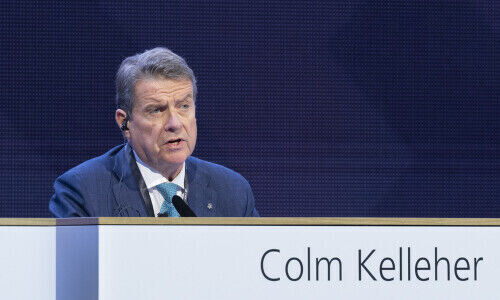UBS Charts Bold Course: Balancing Leadership, Regulation and Rewards
At its recent annual general meeting in Lucerne, Swiss bank UBS addressed significant issues, notably resistance to stricter capital requirements and the bank’s compensation strategy.
All agenda items, including the compensation report (subject to an advisory vote), proposals for board appointments, a dividend of $0.90 per share, a share capital reduction, and a new share buyback program, were approved by shareholders at the annual general meeting (AGM).
Chairman Colm Kelleher defended the bank’s pay structure in his remarks.
«We are convinced that our compensation structure is effective and strongly aligned with our shareholders’ interests,» he stated. He also touched on employee compensation, emphasizing that competitive rewards are essential for maintaining global talent.
Critical Phase
The issue of executive pay was also scrutinized. «Managing a global bank while orchestrating the merger of two globally systemically important banks – an unprecedented challenge – requires exceptional skills. Strong leadership is indispensable in such a critical phase,» Kelleher added.
This comment came on the heels of CEO Sergio Ermotti’s reported total compensation of 14.9 million Swiss francs ($18.2 million) last year. The bank stressed that imposing salary caps would undermine its competitiveness, affecting all stakeholders.
Challenging Regulatory Debates
Kelleher and Ermotti addressed concerns over lobbying activities. Critics have alleged that UBS is overly active in opposing higher capital requirements. Kelleher responded by saying, «An overly stringent regulatory framework poses a significant risk to UBS’s long-term success. It is our fiduciary duty to mitigate this risk on behalf of our shareholders.»
He further noted that the bank’s interactions with authorities and political figures have consistently been conducted in an appropriate, constructive, and respectful manner. «We have presented our analyses and discussed the consequences of extreme capital requirements, and we will continue to do so,» he said.
Expressing Confidence
He warned that excessive capital mandates could damage not only UBS but also Switzerland’s financial center, affecting shareholders, clients, and employees alike.
CEO Ermotti echoed these sentiments, expressing confidence that Switzerland will benefit from a globally competitive and diversified financial center with UBS at its core. «We will continue to engage proactively and reactively in the debate over future banking regulations,» he affirmed.
Expanded Share Buyback Program
In a show of robust support, shareholders granted a majority of approvals to the actions of the board and management. All nine board members nominated for re-election were confirmed, with Renata Jungo Brüngger and Lila Tretikov elected as new members.
The meeting also approved a new share buyback program, authorizing the repurchase of up to $2 billion in UBS shares. This, in combination with the unexhausted 2024 program, could result in up to $3 billion worth of repurchases within the year, conditional on the premise that capital adequacy requirements «do not change immediately and significantly.»
Balancing Several Challenges
Under the current buyback program, approximately $1.5 billion has already been used to acquire 53 million shares at an average price of 27.33 francs, with these shares slated for cancellation.
This comprehensive update from the UBS general meeting underscores the bank’s commitment to balancing competitive executive compensation, maintaining robust regulatory discussions, and strategically deploying capital through share repurchases – all while positioning itself at the heart of Switzerland’s dynamic financial landscape.



























